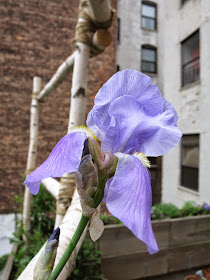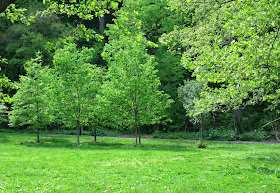First, to assemble:
From Harlem I caught the 2 to Times Square. Ordinarily the 2 would take you all the way to the end of the line, at Flatbush Avenue in Brooklyn. But the MTA wasn't going to make our foraging commute easy, no way: the Brooklyn 2 was down for the count. At Times Square I switched to the Q. That took me to Avenue J, in a part of Brooklyn I barely know (above). Real houses in real gardens. With real dandelions. I walked from there for a pleasant near-mile to that 2 stop to meet up with the people who'd signed up for the Dead Horse Bay outing.
Within ten minutes we'd assembled, variously transported by foot, bus and cab, at this deeply ungreen corner of Nostrand and Flatbush. It was sticky, the first hot day of the year. From there we hopped the Q35 bus. Oh, yippee: no airconditioning. But everyone perked up once we'd left the urban choke behind and started to pass houses on stilts and lobster shacks and open green spaces. Floyd Bennett Field on the left drew admiration.
The bus dropped us off, we gathered two more walkers who had driven out to park nearby, and headed into Brooklyn's wild west.
The paths were springlike and we found many dandelions and lots of dead nettle (below) in bloom. We paused often to look at field garlic and mugwort, poison ivy and sumac, wild lettuce, mustard garlic, pokeweed and bayberry. Two ticks joined the party and were sent to meet their maker. I passed Tabard around.
Oodles of garlic mustard at the perfect stage for picking.
Violets - I've never seen them at Dead Horse Bay.
The reeds (invasive Phragmites australis) dominate the edges of the shoreline here. Nothing can grow inbetween them except tenacious poison ivy. Small songbirds darted about, flashes of yellow.
On the edge of this old landfill, above the high water mark, I found many little indigenous sea rocket (Cakile edentula) seedlings. They would be a good kitchen crop for gardeners with full sun.
Hey. I said it was the wild west.
After a break for sandwiches and the good old
field garlic cheese bread (I'd better come up with better walk snack - some people had eaten it before, on a previous outing), we rounded the bend and headed down the really cluttered part of the beach. Very Mad Max.
Coney Island is the point on the left. Storms stopped over the city. Later we passed storm drains littered with trash that had poured into them.
Bottles and shoes and clocks and crockery keep eroding from the edges of the fill.
We passed photographers and film makers and fallen down trees.
The storm in the north darkened.
We arrived back at the bus shelter - real shelter - at the edges of a downdraft's flurry, but the action moved on, and left us dry. The graffiti was prophetic. The return commute was creative even by the MTA's Machiavellian weekend standards, and I arrived home in the early evening with saucer eyes. But carrying rum.
Nothing a sizeable mojito could not cure. A good day, with good people.
























































